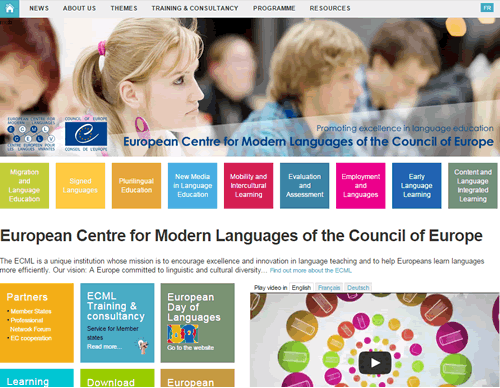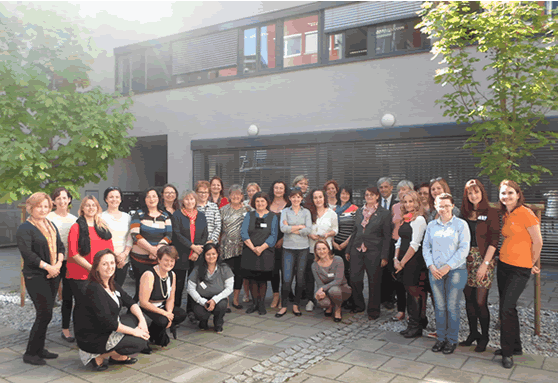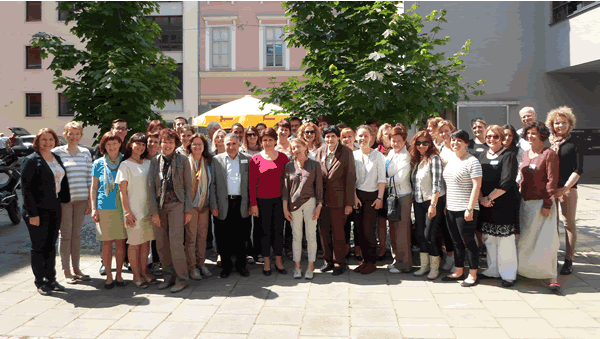- Under preparation: 2016-2019 ECML programme of activities “Languages at the heart of learning”
- ECML website relaunched
- ECML forthcoming workshop
- Content and Language Integrated Learning
- National developments
- “European Portfolio for student teachers of pre-primary education (Pre-elementary)”
- "Plurilingual whole school curricula (PlurCur)"
Under preparation: ECML 2016-2019 programme of activities “Languages at the heart of learning”
The 2016-19 programme is on its way. The project proposals, submitted either by teams or by individual candidates, are being initially assessed by an expert advisory group and will be examined by the Bureau of the ECML Governing Board to draw up of a shortlist of projects. This shortlist will be presented to the Governing Board for the final selection of projects and adoption of the programme (22-23 October 2015). The programme will focus on the following broad themes which were identified as priority areas by the ECML member states:
ECML website relaunched

The ECML website has just been relaunched with a new look and a series of new features.
The biggest change is the showcasing of the Centre’s work around nine key themes: Plurilingual Education; Early Language Learning; New Media in Language Education; Employment and Languages; Evaluation and Assessment; Mobility and Intercultural Learning; Migrants; and Language Education; Signed Languages and Content and Language Integrated Learning.
Each theme contains: an introduction; a wide variety of practical resources and reference tools produced by the ECML, by the Language Policy Unit of the Council of Europe and by other organisations at European and national level; recent ECML projects and offers of training and consultancy activities to ECML member states.
Over the coming months we plan to further develop this area on an ongoing basis with new resources from the Centre’s current projects as well as news, related research, videos, interactive materials and details of activities, conferences and experts.
A new video on the homepage explains in 2 minutes how the Centre operates and what it can offer to professionals involved with education and in particular language education. The clip was developed through the project "ECML publications for plurilingual and intercultural education in use (PIU)" and is now available in English, French and German.
The member state pages on the new site now offer an overview of national involvement in the ECML’s activities, the work of the contact points in 33 countries and access to a host of resources related to national education system.
These are just a few of the many new ‘treasures’ we invite you to discover!
ECML forthcoming workshop

“Developing migrants' language competences at work (Languageforwork)”
(Graz, Austria, 24-25 June 2015)
Project team: Matilde Grünhage-Monetti, Germany (coordinator); Florence Mourlhon Dallies, France; Alexander Braddel, United Kingdom; María Teresa Hernández García, Spain.
The workshop will focus on supporting adults to develop work-related language skills in the majority language(s) of the country where they are resident. Typical learners include migrant/ethnic workers and also low-skilled workers who are native speakers of the majority language(s) of the country. The workshop is concerned with work-related language learning for adults.
Expected workshop outcomes: access to a European multidisciplinary professional network; greater understanding of adult language learning for vocational contexts in different European countries; greater awareness and understanding of the role of language development for vocational competence.
The final project publication will be released in December 2015.
• Project website
• Workshop information
Content and Language Integrated Learning (CLIL)
ECML workshop “Literacies through Content and Language Integrated Learning: effective learning across subjects and languages”
(CLIL and literacy) (Graz, Austria, 2-3 June 2015)
The project aims to develop CLIL approaches, which teachers can use in the classroom, with a special focus on providing support for academic literacies in secondary education. A guide for transforming CLIL practice will be developed, evaluated, adapted and disseminated by practitioners.
32 participants from 26 countries worked on the principles that underlie the model of pluriliteracies, sharing insights and planning joint transnational dissemination of the model. Foreign language teachers and teachers of social and natural sciences teaching in CLIL programmes through the medium of French, German, English or Spanish at secondary school, as well as teacher trainers involved in secondary school CLIL teacher training analysed sample teaching materials, micro-teaching sessions using these materials, and evaluated the approach taken in these materials.
Those wishing to experiment further with the new teaching approach and materials by including them into their teaching/teacher training practice will create a professional learning network after the workshop.
• Interviews with workshop participants
•
Project website (English / German)
Conference “Current challenges in language education in Slovakia: what’s next?” according to the Language, Literature and Culture in Education international conferences framework
(Nitra, Slovak Republic, 14-16 May 2015)
The primary focus of the conference was language education and development of plurilingualism and CLIL and bilingual education. Two ECML projects were presented on this occasion: “Literacies through CLIL” (2012-2015), presented by Kevin Schuck, project team member; and “Curriculum development for Content and Language Integrated Learning (CLIL-CD)” (2008-2011), presented Maria Jesus Frigóls, project coordinator.
• Conference description: English,
French,
German,
Spanish
New ECML thematic collection on Content and Language Integrated Learning
Content and Language Integrated Learning (CLIL) plays an increasingly important role in language education, both as a feature of foreign language teaching and learning, and as an element of bilingual and plurilingual education. The ECML has just launched a thematic collection on the topic: in addition to featured publications and practical project outputs relating to CLIL, the collection offers a wide range of related resources for teachers and teacher trainers working in different sectors and in different languages, as well as relevant Council of Europe policy documents and EU resources.
Recently released: Serbian version of the European Framework for CLIL Teacher Education
 Dejvid Marš, Peter Mehisto, Diter Vulf, Maria Hesus Frigols Martin, Evropski okvir za obrazovanje CLIL nastavnika - Okvir za profesionalni razvoj CLIL nastavnika (2015)
Dejvid Marš, Peter Mehisto, Diter Vulf, Maria Hesus Frigols Martin, Evropski okvir za obrazovanje CLIL nastavnika - Okvir za profesionalni razvoj CLIL nastavnika (2015)
The ECML publication was initially edited in English, French and German in 2011 and has just been translated into Serbian by the Faculty of Philology, University of Belgrade (translation: Sava Popovic, coordination: Julijana Vuco and Katarina Zavišin).
• Download
the publication
• Go
to the project website “Curriculum development for content and language integrated learning (CLIL-CD)” (2008-2011)
National developments
Latest news from the Austrian Centre for Language Competence (ÖSZ), Austria
The latest newsletter (in German) offers many new initiatives and resources. You will find, among others, suggestions for the European Day of Languages 26 September 2015, as well as information on the European Language Label, the use of the electronic version of the European language Portfolio for secondary schools, new releases and major events.
Two key resources for the teaching of modern languages in France
The new portal dedicated to Modern Languages has been launched in April 2015 on Eduscol – the ministerial website for educational professionals. It provides a unique point of reference for all the resources and information which may be useful for foreign languages teachers or teacher students in lower and upper secondary and post-graduate education. It offers a wide range of free pedagogical resources sorted by levels and programmes, for different educational settings, for evaluation and testing, digital materials, as well as institutional information (official documents and programmes). In addition to the sections "A la une" (Featured) and "Zoom", four main categories can be found: Teaching, Information, Training and News.
Moreover, Eduscol offers nine thematic sections providing video materials filmed during the classes in primary and secondary schooling which illustrate language teaching practices.
• Slideshow specifying the context for the creation and development of these resources (in French)
• Synopsis in order to find more easily videos and make links between them (in French)
Léargas website relaunched (Ireland)
Léargas, the Education Service in Ireland and Irish National Contact Point for the ECML, has just relaunched its website with an extremely user friendly design and detailed contents on the work of the Centre and the European Day of Languages. Enjoy your visit!
• Web section dedicated to the ECML
• Web section dedicated to the European Day of Languages
Liechtenstein: Li-Lingua: Sprachenaufenthalt 2.0 - für qualitative und im Ausland nachhaltige Sprachkurse
ERASMUS+ Key Action 2: Cooperation for innovation and the exchange of good practice.
Schulamt des Fürstentums Liechtenstein, Vaduz
The aim of the 2-year project is to establish a new, more efficient framework for study abroad programmes for the students of the Liechtenstein Gymnasium. It is envisaged to achieve this through the adoption, adaptation and use of tools developed by the ECML’s recently completed project “Mobility programmes for sustainable plurilingual and intercultural learning (PluriMobil)” – both creating the framework and simultaneously testing it in practice. A ‘PluriMobil toolbox’ for the Liechtenstein Gymnasium will be developed and tested out in a 14-day pilot study in the UK involving 109 pupils from the Gymnasium, accompanied by 3 assistants and 5 teachers. This project represents a clear added value for the ECML in piloting and implementing the results developed through the Centre’s Plurimobil project at a national level.
Website of the initiative (in German)
“European Portfolio for student teachers of pre-primary education (Pre-elementary)”

Project team: Francis Goullier (coordinator), Natalia Orlova, Marie Roussi, Catherine Carré-Karlinger
The project (2012-2015) aims to develop a tool to encourage reflection by student teachers on the professional skills and attitudes necessary to teach children of between 3 and 6 years old which takes account of the different languages and cultures in the classroom.
At the recent project workshop (21-22 April 2015, Graz, Austria), 27 participants from 24 countries analyzed the sections of the portfolio which focus on personal reflection on the professional skills required to promote intercultural and language skills of children in preschool education. Three aspects were highlighted: the recognition of the plurilingual dimension in language education of children, common components to all language work situations with children regarding the skills needed by teachers and educators, and the emphasis on the role of personal reflection in the initial and in-service training. Participants confirmed the direction taken in conceptualizing the document and made proposals for achieving greater effectiveness and for best meeting users’ expectations. These will be reflected in the further stages of the drafting process. The publication will be presented during the programme's final conference (10-11 December 2015).
• 4 video testimonials of participants on the workshop
“Plurilingual whole school curricula (PlurCur)”

Coordination team: Britta Hufeisen (coordinator), Elisabeth Allgäuer-Hackl, Kristin Brogan, Joachim Schlabach
The project “Plurilingual whole school curricula (PlurCur)” (2012-2015) aims to pilot and assess the concept of a plurilingual, inclusive and intercultural whole school policy comprising majority and minority, regional, heritage and neighbouring languages. It will provide tools which help to clarify, develop and implement plurilingual, intercultural and inclusive whole school policies in different contexts in ECML member states.
The final project workshop (ECML, Graz, Austria, 7-8 May 2015) brought together 36 experts from 27 countries: professionals in educational policies and school management, teacher trainers, teachers and researchers professionals responsible for language(s) and/or subject teaching and learning, experienced with/interested in plurilingual whole school policies, as well as teachers who have implemented projects in their respective schools as part of the PlurCur project. They discussed possibilities for implementing plurilingual whole school policies, presented PlurCur case studies, summarised the latest research in their field related to pluri- and multilingualism, discovered tools for applied whole school curriculum, and developed further ideas and initiatives to support plurilingual whole school policies. The final project results will be published in December 2015.
• Participants’ statements (videos)
• Project website
Quick links
Council of Europe
Council of Europe news page
European Day of Languages
European Centre for Modern Languages (ECML)
Language Policy Unit
European Charter for Regional or Minority Languages
Pestalozzi Programme
Stay connected
News on the ECML portal
ECML on Facebook
ECML on Twitter
ECML activities 2015
All issues of the European Language Gazette
Not interested anymore? Click here to unsubscribe.
European Centre for Modern Languages of the Council of Europe
Promoting excellence in language education
Centre européen pour les langues vivantes du Conseil de l´Europe
Pour l’excellence dans l’éducation aux langues
A - 8020 Graz, Nikolaiplatz 4
T +43 316 323554-20
F +43 316 323554-4
www.ecml.at
Follow us on  Facebook
Facebook  Twitter
Twitter